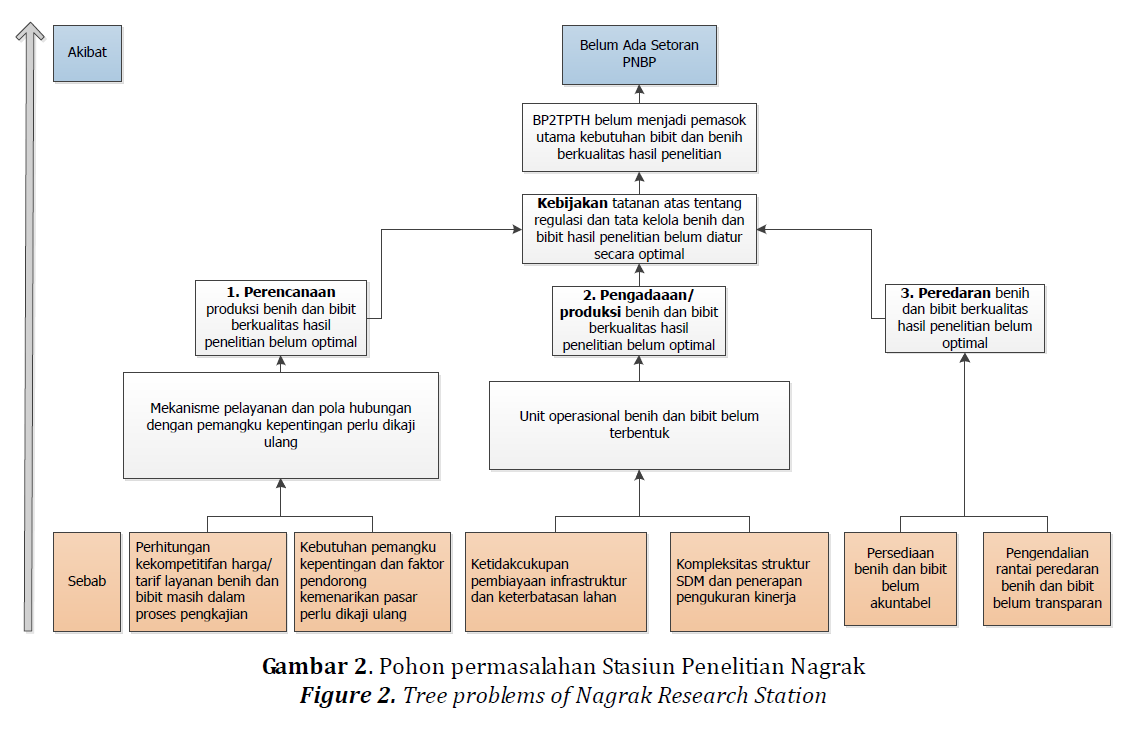The Development of Non Tax State Revenue Potency by Applying the Logical Framework Approach : A Case Study of Nagrak Research Station in Bogor District, West Java

Downloads
The Indonesian government strives to increase non-tax state revenues (PNBP). One of the potentials PNBP is using the state assets, such as research stations,for the public interest. This paper was aimed to formulate a strategy for the PNBP potential development using the Logical Framework Approach (LFA), with a case study at the Nagrak Research Station, Bogor. In order to avoid the failure when the PNBP potential development’s stages are implemented, policy makers need to build a hierarchy based on logical thinking of input, activity, output, impact, objectives and summarized them in a work plans matrix. The process of LFA development starts with the analysis of problems, goals,and strategies. Data and information were obtained through participant observation and documentation studies. The results showed that the commercialization of the operational units of research quality’ s seeds and seedlings at the Nagrak Research Station must be supported by the government policy, including: (1) planning of seed and seedling production with the consideration of price competitiveness (2) seeds and seedling production with the financial management flexibilities, and (3) seeds and seedling distribution with stakeholders protection from the non-quality seeds and seedling’s utilization.
Abdurrahim, M. F. H., Daryanto, A., & Nurmalina, R. (2014). Starategi pengembangan Balai Penelitian Bioteknologi Perkebunan Indonesia. Jurnal Manajemen & Agribisnis, 11(3), 199–208.
Adha, Lulu Hadi. (2011). Kontrak build operate transfer sebagai perjanjian kebijakan pemerintah dengan pihak swasta. Jurnal Dinamika Hukum, 11(3), 548–558.
BAPPENAS. (2013). Mengukur Kompetensi Unit Riset. Diambil tanggal 17 Oktober 2018 dari https://bappenas.go.id/files/4913/5228/1155/11mengukur-kompetensi-unit -riset_20081123002641_10.pdf.
Benyamin, L., Hidayat, D., & Herlinda, S. (2012). Scientific productivity and the collaboration intensity of Indonesian universities and public R&D institutions: Are there dependencies on collaborative R&D with foreign institutions? Technology in Society, 34(3). 227–238.Doi: https://doi.org/10.1016/j.techsoc.2012.06.001.
David, F. R. (2009). Manajemen Strategis:Konsep. PT. Perhallindo: Jakarta
Dinarjito, A. (2017). Analisis temuan badan pemeriksa keuangan atas penerimaan negara bukan pajak kementerian/lembaga. Info Artha, 1(1), 1–16.
Ginoga, K. L. (2015). Kebijakan revitalisasi pelayanan penelitian dan pengembangan berbasis teknologi informasi di Pusat Penelitian dan Pengembangan Perubahan Iklim dan Kebijakan. Jurnal Analisis Kebijakan Kehutanan, 12(2), 139–153.
Hadisetiawati, H. (2012). Strategi Kebijakan Pengembangan Minyak Sawit Merah Dengan Pendekatan Logical Framework Approach. (Thesis). Bogor: Pascasarjana Institut Pertanian Bogor.
Kemenristekdikti. (2016). Tingkat Kesiapan Teknologi (TKT). Diambil tanggal 16 September 2018 dari http://ppbt.ristekdikti.go.id/ibt/_assets/docs/TKT-TRL.pdf.
KementerianKehutanan.(2010). Peraturan Menteri Kehutanan Nomor: P.28/Menhut-II/2010 tentang Pengawasan Peredaran Benih Tanaman Hutan. Jakarta: Direktorat Perbenihan Tanaman Hutan.
Kementerian Keuangan. (2015). Kegiatan sosialisasi pembinaan pengelolaan kuangan badan layanan umum. Diambil tanggal 20 Juli 2019 dari http://blu.djpbn.kemenkeu.go.id/index.php?r=publication/article/view&id=10.
KementerianKeuangan. (2017a). Pengelolaan penerimaan negara bukan pajak (PNBP). Diambil tanggal 5 Oktober 2018 dari http://www.anggaran.kemenkeu.go.id/dja/edef-konten-view.asp?id=1370.
KementerianKeuangan. (2017b). Laporan Pemerintah tentang Pelaksanaan Anggaran Pendapatan dan Belanja Negara Semester Pertama. Diambil tanggal 5 Oktober 2018 dari http://www.anggaran.kemenkeu.go.id/dja/edef-konten-view.asp?id=1370.
Kurniasih, D. A. (2016). Pembaharuan pengelolaan penerimaan negara bukan pajak. Jurnal Rechtsvinding, 5(2), 213–228.
Lakitan, B. (2012). Penguatan kapasitas lembaga Litbang :Strategi untuk Indonesia. Diambil tanggal 15 Oktober 2018 dari https://benyaminlakitan.com/2012/11/25/paper-23-penguatan-kapasitas-lembaga-litbang-strategi-untuk-indonesia/.
Martinez, D.E., (2011). The Logical Framework Approach in Non-governmental Organizations. Diambil tanggal 10Maret2019dari https://pdfs.semanticscholar.org/d4f3/21567c5c5d6624f935e23d762c0e5af0493d.pdf
Mcdonald, S., Turner, T., Chamberlain, C., Lumbiganon, P., Thinkhamrop, J., Festin, M. R., … Crowther, C. A. (2010). Building capacity for evidence generation , synthesis and implementation to improve the care of mothers and babies in South East Asia : methods and design of the SEA-ORCHID Project using a logical framework approach. BMC Medical Research Methodology, 10(61), 1–10.
Mulyadi. (2005). Akuntansi Biaya (Ed. 5). Yogyakarta: Aditya Media.
Musnanda, S. (2013). Logical Framework Approach; Pendekatan Kerangka Logis. Diambil tanggal 1 Oktober 2018 dari https://musnanda.com/?s=pendekatan-logical-frame.
Putera, P. B., Akil, H. A., Aminullah, E., Triyono, B., & Hidayat, D. (2013). Struktur baru organisasi lembaga penelitian dan pengembangan pemerintah Indonesia : Sebuah konsep dan respon atas kebijakan penataan dan penguatan organisasi. Jurnal Borneo Administrator, 9(3), 265–283.
Siringoringo, Alfiker(2017). Tata Kelola Badan Layanan Umum.Diambil tanggal 21Juli2019 darihttp://blu.djpbn.kemenkeu.go.id/index.php?r=publication/article/view&id=13
Sitanggang, Yuliana R.U(2012). Penerapan Analisis SWOT dalam Penyusunan Rencana Stratejik (Renstra) pada Pendidikan dan Pelatihan Kepemimpinan Tingkat III Badan Pusat Statistik.Diambil tanggal 25 April 2019 dari
http://pusdiklat.bps.go.id/index.php?r=artikel/view&id=209
Suryawati, S. H., Hikmayani, Y., & Purnomo, A. H. (2010). Strategi peningkatan dan alokasi penerimaan negara bukan pajak untuk peningkatan operasional layanan pelabuhan perikanan. Jurnal Kebijakan Sosial Ekonomi Kelautan Dan Perikanan, 5(2), 211–225.
Susanto, F.A., ER, Mahendrawati., & Ghozali, K. (2012). Analisis perbandingan portofolio aplikasi menggunakan teknik Balanced Scorecard, Critical Success Factors dan SWOT
studi kasus di UNISDA (Universitas Islam Darul Ulum) Lamongan. Prosiding Seminar Nasional Manajemen Teknologi XV.Program Studi MMT-ITS, Surabaya, 4 Februari 2012. hal. C-8-1―C-8-8.
Triyono, B., & Prihadyanti, D. (2017). Peran Kementerian, Riset, Teknologi dan Pendidikan Tinggi dalam penguatan sistem inovasi di Indonesia. Inovasi, 14(1), 1–12.
USAID. (2012). The Logical Framework. Technical Note Number 2. United States Agency for International Development. Diambil tanggal 1 Oktober 2018 dari https://usaidlearninglab.org/sites/default/files/resource/files/2012_12_logical_framework_technical_note_final_2.pdf.
USAID. (2013). Developing results frameworks.Technical Note Final. United States Agency for International Development. Diambil tanggal 1 Oktober 2018 dari https://usaidlearninglab.org/sites/default/files/resource/files/rf_technical_note_final_2013_0722.pdf.
Waluyo, Budi. (2014). Analisis permasalahan pada implementasi pola pengelolaan keuangan badan layanan umum. Jurnal Info Artha, 3, 27–38.




